What is Hemophilia?
Hemophilia is a rare genetic disorder that affects the blood's ability to clot properly. It is characterized by a deficiency or absence of certain blood clotting factors, most commonly factor VIII (hemophilia A) or factor IX (hemophilia B).
As a result, individuals with hemophilia experience prolonged bleeding, even from minor injuries, and may also suffer from spontaneous bleeding into muscles and joints.
Side effects of Hemophilia:
The primary complication of hemophilia is excessive bleeding, which can lead to various health issues if not managed properly. Some common side effects include:
- Joint damage: Bleeding into joints can cause swelling, pain, and stiffness, leading to long-term damage and decreased mobility.
- Muscle bleeding: Spontaneous bleeding into muscles can cause swelling, pain, and loss of function in affected areas.
- Internal bleeding: Bleeding into vital organs, such as the brain, can be life-threatening if not promptly treated.
How is Hemophilia diagnosed?
Diagnosing hemophilia typically involves a series of blood tests to measure the levels of clotting factors in the blood. These tests may include:
- Partial thromboplastin time (PTT): This test measures the time it takes for blood to clot and can help identify abnormalities in the clotting process.
- Factor assay: A laboratory test to determine the levels of specific clotting factors, such as factor VIII or IX, in the blood.
- Genetic testing: In some cases, genetic testing may be performed to identify specific mutations or abnormalities in the genes responsible for producing clotting factors.
Potential treatments of Hemophilia:
While there is no cure for hemophilia, various treatment options are available to manage symptoms and prevent complications. These may include:
- Clotting factor replacement therapy: The most common treatment for hemophilia involves replacing the missing clotting factor through intravenous infusions. Factor concentrates derived from human plasma or produced synthetically are used to restore normal clotting function.
- Desmopressin (DDAVP) therapy: This medication stimulates the release of stored clotting factors in individuals with mild hemophilia A, helping to temporarily increase clotting ability.
- Prophylactic treatment: Some individuals with severe hemophilia may require regular infusions of clotting factors to prevent bleeding episodes and reduce the risk of joint damage.
- Hemostatic agents: In addition to clotting factor replacement, hemostatic agents such as antifibrinolytic medications may be used to promote blood clotting and reduce bleeding during surgical procedures or traumatic injuries.
👉 Contact us for further information and receive acomplimentary consultation.


.webp)
 (1).webp)

.webp)
 (1).webp)


.webp)
 (1).webp)

.webp)
 (1).webp)
